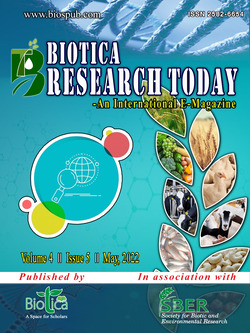
The Role of Indian National Center for Ocean Information Services (INCOIS) in Fishing Industry through Remote Sensing
D. Arun Jenish*
Dept. of Fishing Technology and Fisheries Engineering, Dr. MGR Fisheries College and Research Institute, Ponneri, Tamil Nadu (601 204), India
R. Velmurugan
Dept. of Fishing Technology and Fisheries Engineering, Dr. MGR Fisheries College and Research Institute, Ponneri, Tamil Nadu (601 204), India
DOI: NIL
Keywords: Chlorophyll, Fish aggregation, Potential fishing zones, Sea Surface Temperature
Abstract
Finding and catching fish is usually a difficult task, which raises the cost and results in low profitability. With the launch of OCEANSAT in 1999, which offers a real-time satellite image of ocean colour (chlorophyll) and, when combined with SST, allows for the identification of aggregation fish, a new era has begun. One of the most important pre-requisites for profitable fishing is the identification of possible fishing zones, including the kind and amount of fish available. ESSO-Indian National Centre for Ocean Information Services (INCOIS) gives daily advice to fishermen with precise references to 586 fish landing stations throughout the Indian coast, based on remotely sensed data from several satellites. Even if they arrive to the spot after a day, this information aids the fisherman in identifying the PFZ marked on the maps.
Downloads
not found
Reference
Buttler, M.J.A., Mouchot, M.C., Barale, V., LeBlanc, C., 1988. The Application of Remote Sensing Technology to Marine Fisheries: An Introductory Manual. FAOFish.Tech.Pap. (295), p. 165.
Gower, J.F.R., 1972. A survey of the uses of remote sensing from aircraft and satellites in oceanography and hydrography. Pac.Mar.Sci.Rep.Inst.Ocean.Sci., Sidney, B.C., Can., pp. 72-3.
Somvanshi, V.S., 2002. Satellite remote sensing applications in marine fisheries. Fishing Chimes 22(2), 27-31.
